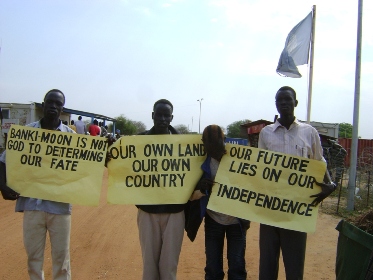UN chief’s anti-secession remark triggers South Sudan protest
By Philip Thon Aleu
February 1, 2010 (BOR) – A group of Southern Sudanese marched to the base of the United Nations Mission in Sudan (UNMIS) here Monday protesting an anti-secessionist statement attributed to the UN Secretary General. This remark also generated criticism among South Sudanese academics in Khartoum.
 Ban Ki-moon had said Saturday that UN and the AU would work to avoid southern Sudan secession in a referendum scheduled for January 2011. The UN chief in a joint interview with AFP and RFI radio said “The UN has a big responsibility with the AU to maintain peace in Sudan and make unity attractive… We’ll work hard to avoid a possible secession.” His statement came one day after similar statements by the chairman of the African Union (AU) Commission Jean Ping who said secession would lead to another war in Sudan and push Darfur rebels to seek self-determination.
Ban Ki-moon had said Saturday that UN and the AU would work to avoid southern Sudan secession in a referendum scheduled for January 2011. The UN chief in a joint interview with AFP and RFI radio said “The UN has a big responsibility with the AU to maintain peace in Sudan and make unity attractive… We’ll work hard to avoid a possible secession.” His statement came one day after similar statements by the chairman of the African Union (AU) Commission Jean Ping who said secession would lead to another war in Sudan and push Darfur rebels to seek self-determination.
The protesters hold banners saying “our future lies in our independence.” In a written speech delivered at UNMIS compound, the angered group claims that Ban Ki-moon’s remarks at the 14th African Union (AU) summit on Saturday in Addis Ababa never “examined the negative part of [Sudan’s] unity.”
Bor protesters say Ban’s statement indicates that the UN admires Sudan’s wars, slavery and illiteracy under Khartoum administration. “Sudan has never been in peace not because the people Sudanese communities are against peace but…the government had been misruling….rich cultures,” the protest speech reads in part.
The demonstrators, mainly youth, call on the UN chief to apologize saying “Ban Ki-moon, repent before judgment.”
An officer at the UN camp, flanked by his colleagues at the UNMIS says at the time the letter was issued that the peacekeepers’ mandate does not include deciding on the future of Southern Sudan. The officer apologized for the local understanding of the UN chief’s statement and pledged to hand the letter to higher authorities.
SOUTH SUDANESE INTELLECTUALS OPPOSE UNITY
In an interview today with Professor Deng Awuor who teaches social studies at Juba university campus at Kodoro, east of Khartoum, he outlined historical reasons for the split expected next year in the 2011 referendum for secession of the South.
He said that British and Egyptians jointly ruled Sudan for over 40 years but failed to make unity attractive between Sudanese Africans in the south and Arabs in the north. Instead they initiated and introduced detrimental policies of divide and rule which were later on adopted by successive Khartoum-based ruling elites, he said.
He said they never succeeded in anything including making unity of the country attractive nor did they lay down strong foundation for unity but deployed divisive policies which recognize provincial leaderships.
The independence of the country on 1st January 1956 came when issue of identity became the central issue to those who regards themselves as the real Sudanese through oppressive initiatives in managing affairs of the African tribes.
In forum discussions at the university, one of the contributors said that the Comprehensive Peace Agreement was to build and repair the long strained south-north relationship, giving a last chance – a period of six years – to the repressive and extremist leaders in Khartoum to make unity attractive, but they failed to make it.
“If Sudanese people and government could not make it possible to make unity attractive, can the AU and the UN Secretary General make unity attractive within one year?” he posed.
According to the participant, Africans, whether they are Sudanese, Muslims or Christians want the best initiative against discriminatory tradition and culture, and work to liberate the corrupted African minds, hearts and souls by tradition and culture that do not respect human rights.
“If UN and AU can do this within one year, before the deadline for referendum, the enslaved and oppressed African people of the southern Sudan may accept to stay as one in a United States of Sudan,” he said.
However, he was quick to add UN, the AU and the free developed world know the history of the struggle of the African people in Sudan, especially the people of the southern Sudan and Darfur to transform the colonial thinking and minds of those who have clung to power using religion. He said individuals in the center, since entrance of Mohamed Ali in 1820, have continued to behave like a colonial power and treat the indigenous African tribes as slaves.
“African tribes in Sudan today are enslaved and their mind being corrupted by Arab Islamic ideology, and imprisoned by imposed Arab religion, tradition and culture which only serve the interest of the Arab Islamic leaders, and care less about the unity of Sudan,” he explained.
The African people of the southern Sudan have given them enough time to change their discriminatory behaviors and culture and to live as equal citizens in Sudan but refused and continued to kill, discriminate, corrupt the mind, heart and soul of our people to make them go to hell, he said.
Another participant too furiously said the Secretary General has acted out of his capacity hence making it impossible for him to understand – “he comes from the culture equal our own as South Korea was once part of North Korea,” he said.
“How come he is so quick to forget such history?” he posed.
(ST)
Ngor Arol Garang contributed to this report from Khartoum.
